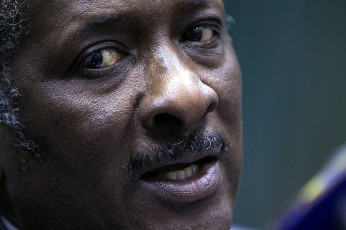Sudan’s labor union doesn’t buy 2013 budget, calls it too rosy
December 11, 2012 (KHARTOUM) – The head of Sudan’s labor union scoffed at the government’s 2013 budget proposal saying it is based on unrealistic figures and expressed doubt over the deficit and inflation targets included in it.

Ghandour rejected finance ministry assertions that the government cannot afford raising wages because of the deficit.
“Workers make up [only] 3% of the population and a lot of items [were] funded [in the budget] but once it became about workers the minister started talking about the deficit,” he said.
He disclosed that the labor union’s central commission will meet next week for a “decisive” meeting on the issue of wages.
The Sudanese finance minister and other officials are arguing that there is simply not enough money to fund wage increases in the budget and that to do so they will have to further lift subsidies on fuel.
Sudan has been adopting a contractionary fiscal policy since the oil-rich south became an independent state on July 2011. The new state retained 75% of the oilfields which provided most of Sudan’s income, exports and foreign currency inflow.
Oil now accounts for 3-5% of Sudan’s GDP, down from around 15% , while providing a much-reduced 20-25% of revenue, the International Monetary Fund (IMF) said in a recent report. The latter also said that Sudan’s GDP is projected to shrink by -11.1% this year and -0.6% in 2013.
The 2013 budget projects 25.2 billion Sudanese pounds (SDG) in revenues and 35.0 billion SDG in expenses leaving a deficit of 10 billion SDG ($1.5 billion) which equals 3.4% of the country’s Gross Domestic Product (GDP).
The budget targets an inflation rate of 22% and an exchange rate of 4.42 to the dollar.
But Ghandour sounded sckeptical over these numbers and noted that the amended budget adopted last July forecasts 21% inflation rate and an exchange rate of 4.4 Sudanese pound to the dollar.
The latest annual inflation rate stands at 46.5% and the dollar trades at 6.50 in the black market.
” Where does the fault lies in reaching these flawed indicators? We expected deep measures to address where the mistake lies which resulted in big discrepancies between the finance [ministry] projections either in annual or amended budgets and is it an error in policies or estimates?” Ghandour asked.
He warned against raising people’s expectations because of these figures without any impact on the ground and called for submitting a budget based on “real numbers”.
“The most optimistic [person] expects [Sudan] to record a 1.5% monthly deficit to reach 70% in September 2013,” Ghandour said.
CLASH OF TWO MINISTERS
In a related issue the finance minister Ali Mahmoud Abdel-Rasool clashed with the minister of Social Welfare Amira al-Fadil at the parliament over subsidies to poor families and raising the minimum pension figures.
Abdel-Rasool dismissed the demand saying that no additional allocations will be made to poor families without ensuring its conformity with the law.
The minister stressed that pension funds must contribute to raising the pension rates and accused these funds of setting money aside as opposed to sending it back to the treasury.
He slammed al-Fadil accusing her of seeking a publicity stunt in parliament despite discussing the same issue at the cabinet meetings.
Al-Fadil complained at the parliamentary meeting that budget the excluded support for poor families and raising the minimum wage. She accused the finance minister of reneging on commitment to support 100,000 families and merely approved support for ten months and at 100 Sudanese pounds monthly per family as opposed to 250.
The finance minister however said that raising the minimum wage will cost 5.2 billion and will have to be funded by either raising taxes or increasing borrowing which he said will fuel inflation.
(ST)
